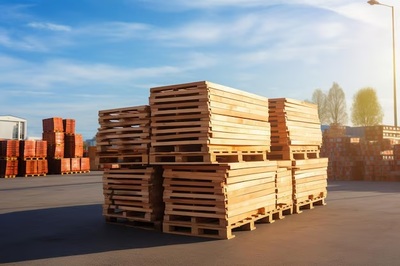How Do Pallet Suppliers Improve Product Safety During Transport
-
Transport plays a critical role in global trade. Every day, millions of products move from one place to another. These goods must reach their destination safely without damage. Businesses rely on strong systems to protect items during transit. That is where pallet suppliers make a difference.
Introduction to Transport and Safety
Transport is the backbone of supply chains. Companies move goods by road, rail, air, and sea. Each mode of transport comes with risks. Shocks, vibrations, and rough handling can damage goods. Broken products cause financial loss. They also harm customer trust. This is why product safety is a priority in logistics.
Why Product Safety Matters
Product safety is essential in transport. It ensures goods arrive in the same condition they left the warehouse. Damaged goods lead to high replacement costs. They also cause delays in customer delivery. Poor packaging or unstable stacking often results in loss. A proper system protects both fragile and heavy items. Strong pallets form the base of this system.
The Role of Pallet Suppliers in Transport
Suppliers provide businesses with the foundation for safe shipping. They design and supply pallets for different industries. Each pallet type serves a specific purpose. Whether it is wood, plastic, or metal, pallets protect goods from impact. They also make handling easy during loading and unloading. Good pallets prevent collapse and keep products stable.
How Pallet Suppliers Improve Product Safety
Suppliers improve safety in several ways. They create pallets that can handle heavy weights. They test materials for strength and durability. Suppliers ensure pallets are the right size for the goods. They also follow international standards. This prevents shifting and reduces accidents. Their goal is to minimise damage at every step of transport.
Key Aspects of Pallet Suppliers
Suppliers focus on many key aspects. They maintain strict quality control. They check for cracks, weak boards, or faulty joints. Suppliers also design pallets for specific industries. Food, pharmaceuticals, and electronics all need special pallets. They provide heat-treated wood to comply with export regulations. They also recycle old pallets to reduce waste. Each step ensures safety and compliance.
Steps Taken by Pallet Suppliers
Suppliers take several steps to ensure the safety of their goods. First, they choose the right material. Wooden pallets are well-suited for handling heavy loads. Plastic pallets are ideal for maintaining hygiene and facilitating easy cleaning. Second, they test weight limits. Each pallet must be able to hold the required load without bending. Third, they design pallets for easy stacking. This prevents slipping and tilting. Lastly, they offer custom pallets for unique goods. These steps ensure transport is both secure and efficient.
Benefits of Choosing the Right Pallet Suppliers
The right suppliers provide many benefits. They reduce product damage during shipping. This lowers replacement and repair costs. They ensure smooth loading with forklifts and cranes. This saves time in warehouses. They follow safety laws for export and import. This reduces delays at customs. They also support sustainability with recycled pallets. These benefits improve overall supply chain performance.
What You Need to Know About Product Safety
Businesses must understand product safety basics. Not all pallets are the same. A wrong pallet can break under pressure. This damages not only goods but also equipment. Companies must know the load capacity of each pallet. They must also store pallets in dry conditions. Wet or broken pallets are unsafe. Choosing the right pallet reduces these risks.
Questions to Ask the Professional
When dealing with suppliers, businesses should ask key questions, such as: What materials do they use? Do they test pallets for weight and durability? Do they meet international safety standards? Do they offer heat treatment for wood pallets? Can they provide custom designs? What is their recycling policy? Answers to these questions show reliability.
How to Choose the Best Pallet Suppliers
Choosing the best pallet suppliers requires research. Look for experience in the industry. Check if they supply to trusted brands. Read reviews from other customers. Ensure they provide pallets that are suitable for your specific goods. Compare pricing but focus on quality. Cheap pallets may break during transit. Good suppliers balance cost and durability. Select suppliers that offer fast delivery and provide excellent support.
Additional Safety Measures in Transport
Pallets work best with proper handling. Goods must be stacked evenly. Heavy items should go at the bottom. Stretch wrap or strapping adds extra security. Warehouses must train staff in pallet handling. Forklifts must operate carefully to prevent tipping. Combining these measures with good pallets ensures safe transport.
The Future of Pallet Suppliers and Product Safety
Technology is shaping pallet design. Some pallets now include RFID tags for tracking. Smart pallets monitor temperature and humidity. This is crucial for food and medicine. Sustainable pallets made from recycled plastic are rising. In the future, suppliers will focus more on eco-friendly designs. This will improve safety while reducing environmental impact.
Conclusion
Product safety is vital in modern transport. Every business depends on reliable systems to move goods. Strong pallets form the foundation of safe shipping. Pallet suppliers play a crucial role by designing, testing, and delivering durable pallets. They prevent damage, cut costs, and support global trade. Businesses must choose suppliers wisely. With the right partner, transport becomes safer, faster, and more efficient.





